人教版七年级下册英语复习课件- Unit 7-Unit 12 知识梳理课件(69张PPT)
文档属性
| 名称 | 人教版七年级下册英语复习课件- Unit 7-Unit 12 知识梳理课件(69张PPT) | 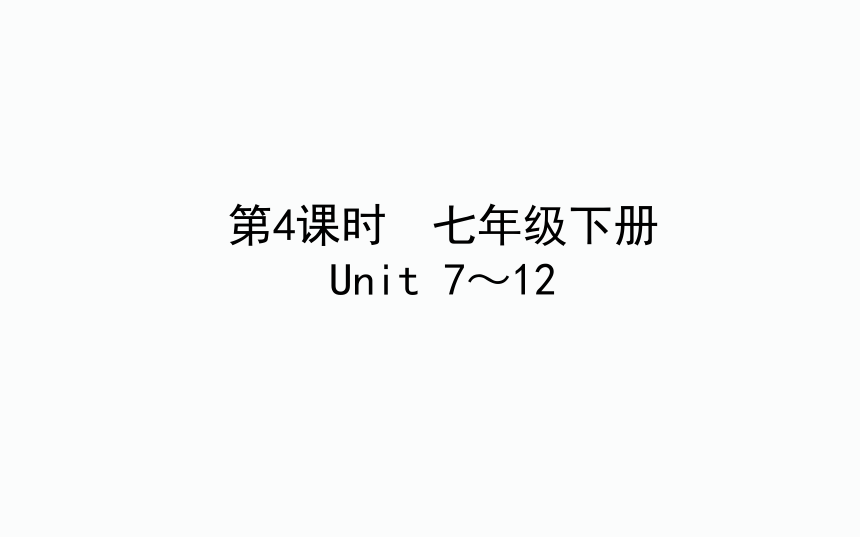 | |
| 格式 | zip | ||
| 文件大小 | 2.2MB | ||
| 资源类型 | 教案 | ||
| 版本资源 | 人教新目标(Go for it)版 | ||
| 科目 | 英语 | ||
| 更新时间 | 2019-12-22 08:46:15 | ||
图片预览

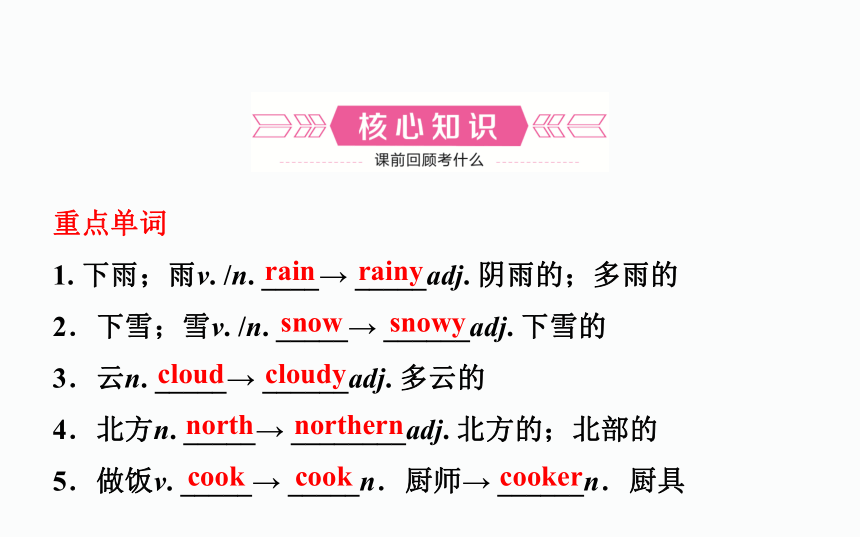
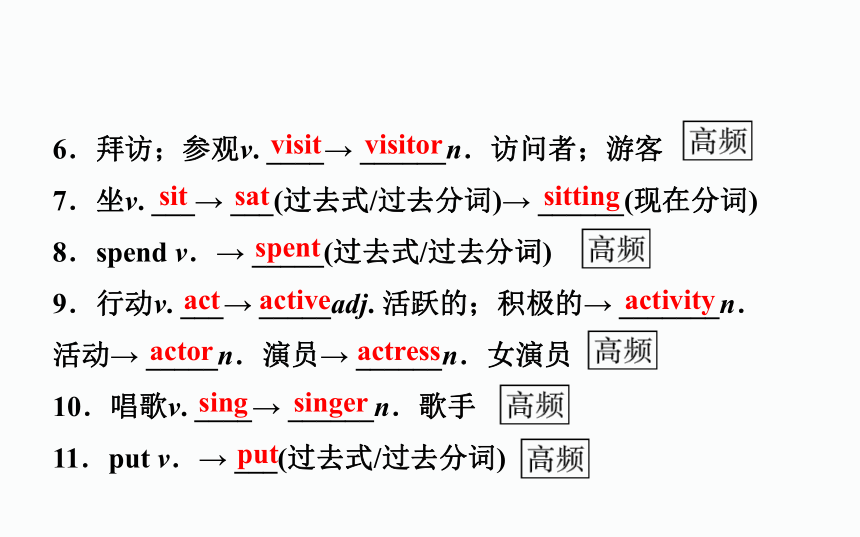
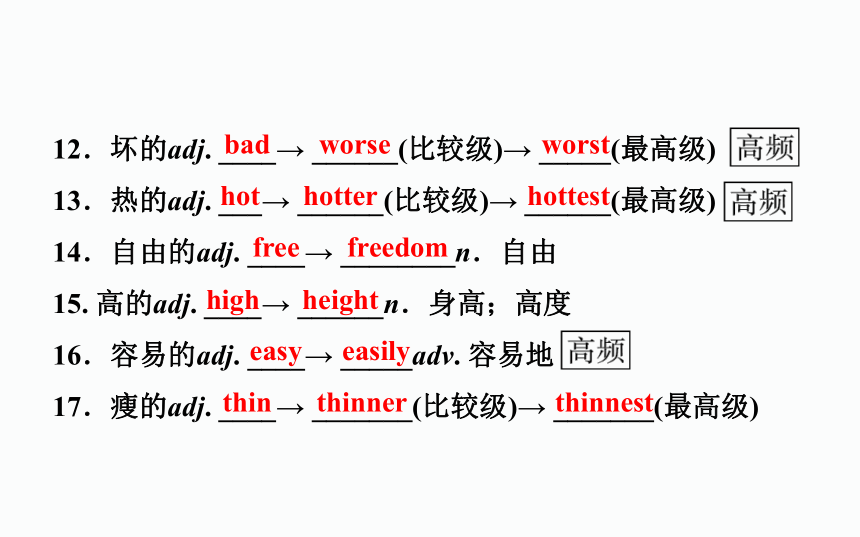
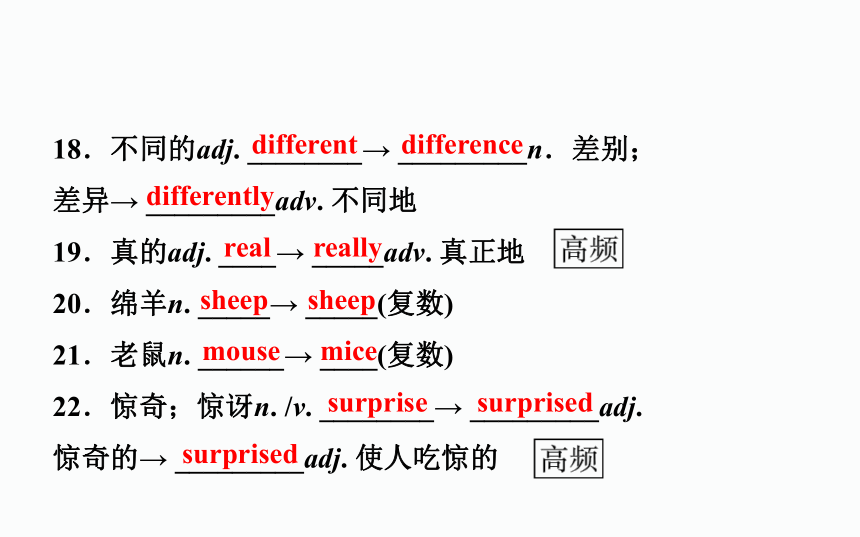
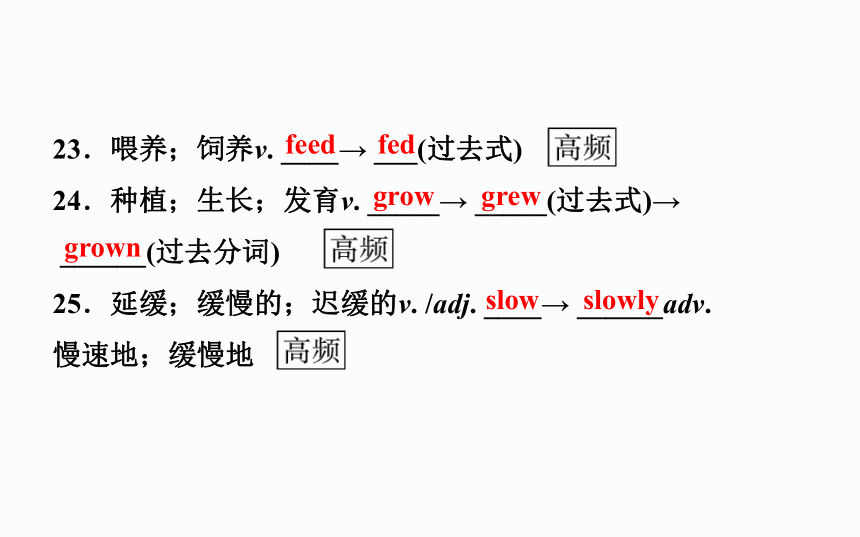
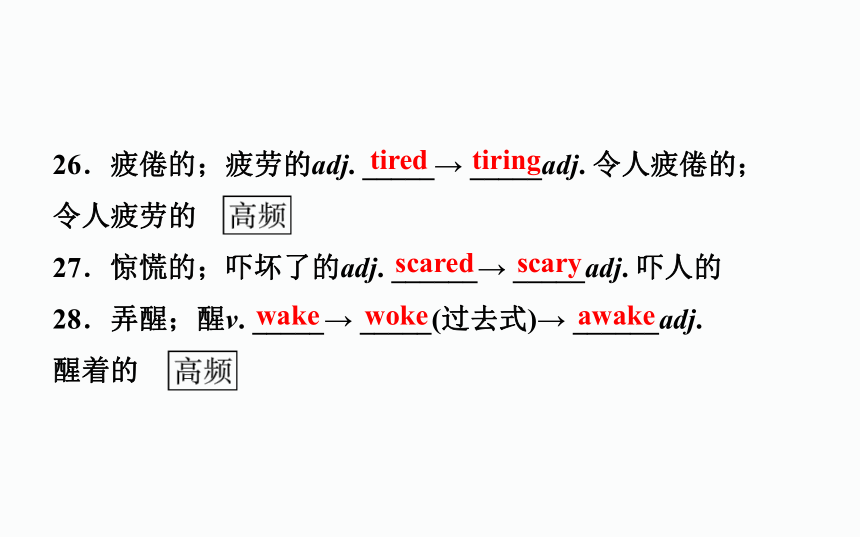
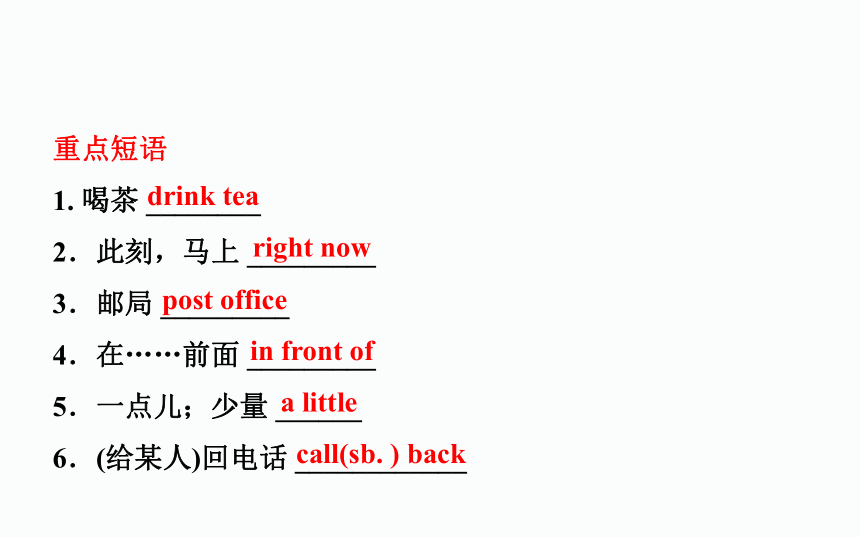
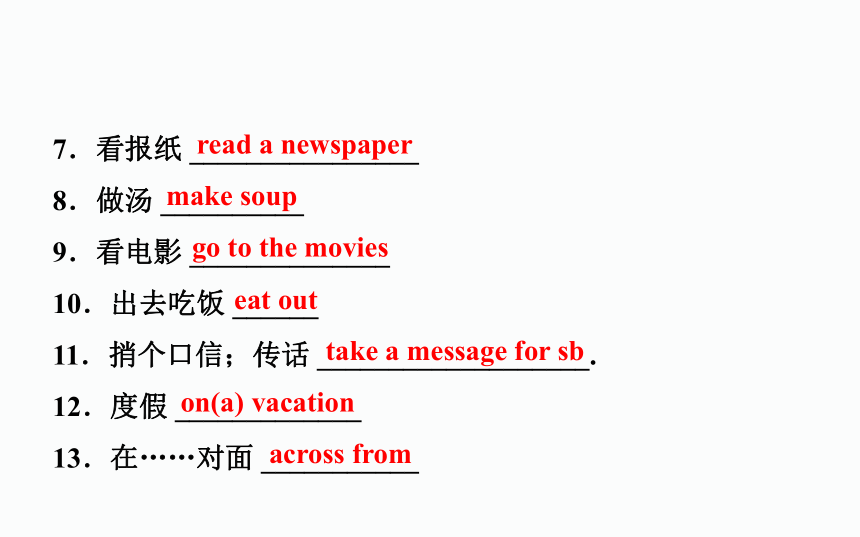
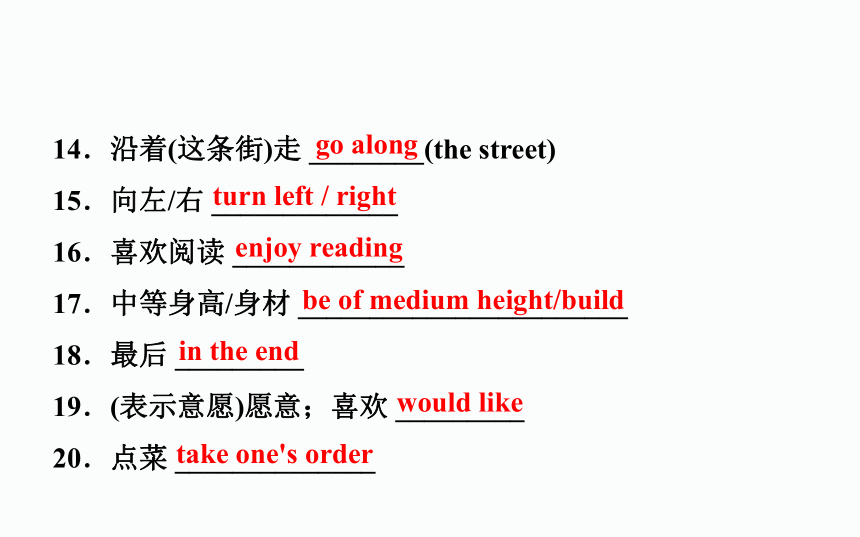
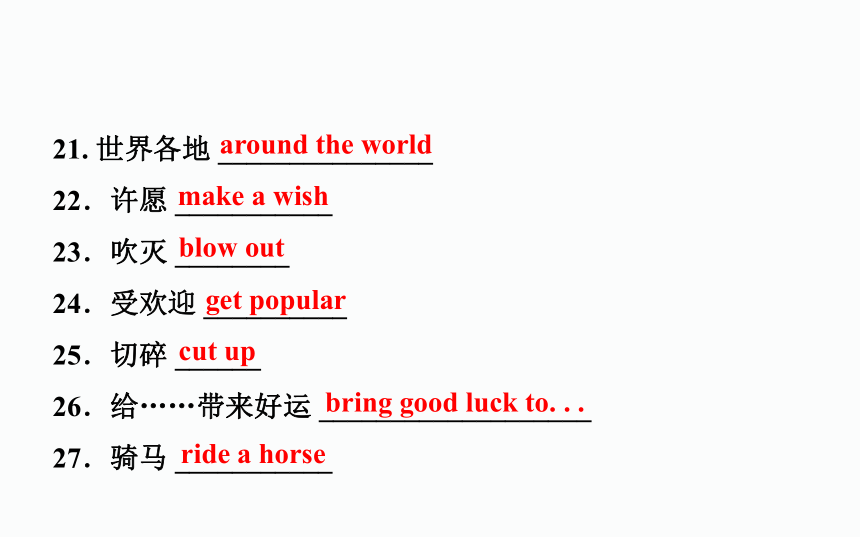
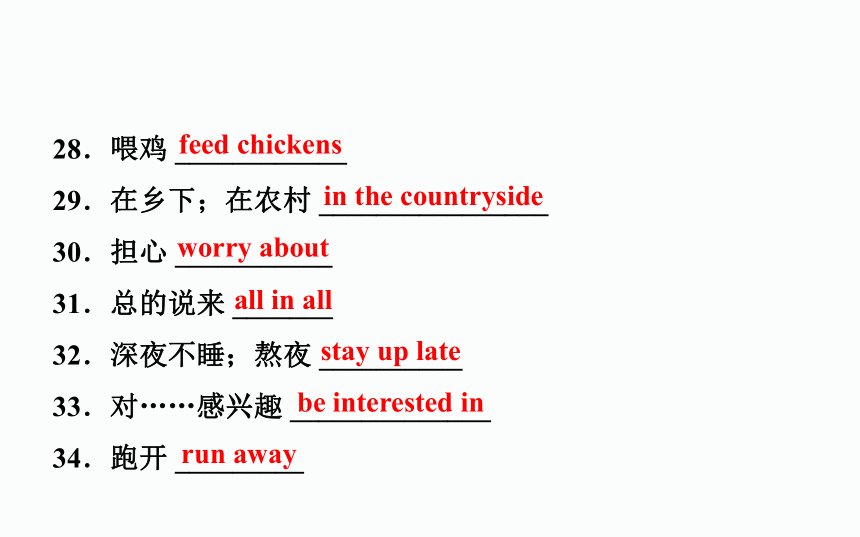
文档简介
课件69张PPT。第4课时 七年级下册 Unit 7~12重点单词
1. 下雨;雨v. /n. ____→ _____adj. 阴雨的;多雨的
2.下雪;雪v. /n. _____→ ______adj. 下雪的
3.云n. _____→ ______adj. 多云的
4.北方n. _____→ ________adj. 北方的;北部的
5.做饭v. _____→ _____n.厨师→ ______n.厨具rainrainysnowsnowycloudcloudynorthnortherncookcookcooker6.拜访;参观v. ____→ ______n.访问者;游客
7.坐v. ___→ ___(过去式/过去分词)→ ______(现在分词)
8.spend v.→ _____(过去式/过去分词)
9.行动v. ___→ _____adj. 活跃的;积极的→ _______n.
活动→ _____n.演员→ ______n.女演员
10.唱歌v. ____→ ______n.歌手
11.put v.→ ___(过去式/过去分词)visitvisitorsitsatsittingspentactactiveactivityactoractresssingsingerput12.坏的adj. ____→ ______(比较级)→ _____(最高级)
13.热的adj. ___→ ______(比较级)→ ______(最高级)
14.自由的adj. ____→ ________n.自由
15. 高的adj. ____→ ______n.身高;高度
16.容易的adj. ____→ _____adv. 容易地
17.瘦的adj. ____→ _______(比较级)→ _______(最高级)badworseworsthothotterhottestfreefreedomhighheighteasyeasilythinthinnerthinnest18.不同的adj. ________→ _________n.差别;
差异→ _________adv. 不同地
19.真的adj. ____→ _____adv. 真正地
20.绵羊n. _____→ _____(复数)
21.老鼠n. ______→ ____(复数)
22.惊奇;惊讶n. /v. ________→ _________adj.
惊奇的→ _________adj. 使人吃惊的differentdifferencedifferentlyrealreallysheepsheepmousemicesurprisesurprisedsurprised23.喂养;饲养v. ____→ ___(过去式)
24.种植;生长;发育v. _____→ _____(过去式)→
______(过去分词)
25.延缓;缓慢的;迟缓的v. /adj. ____→ ______adv.
慢速地;缓慢地feedfedgrowgrewgrownslowslowly26.疲倦的;疲劳的adj. _____→ _____adj. 令人疲倦的;
令人疲劳的
27.惊慌的;吓坏了的adj. ______→ _____adj. 吓人的
28.弄醒;醒v. _____→ _____(过去式)→ ______adj.
醒着的tiredtiringscaredscarywakewokeawake重点短语
1. 喝茶 ________
2.此刻,马上 _________
3.邮局 _________
4.在……前面 _________
5.一点儿;少量 ______
6.(给某人)回电话 ____________drink tearight nowpost officein front ofa littlecall(sb. ) back7.看报纸 ________________
8.做汤 __________
9.看电影 ______________
10.出去吃饭 ______
11.捎个口信;传话 ___________________.
12.度假 _____________
13.在……对面 ___________read a newspapermake soupgo to the movieseat outtake a message for sbon(a) vacationacross from14.沿着(这条街)走 ________(the street)
15.向左/右 _____________
16.喜欢阅读 ____________
17.中等身高/身材 _______________________
18.最后 _________
19.(表示意愿)愿意;喜欢 _________
20.点菜 ______________go alongturn left / rightenjoy readingbe of medium height/buildin the endwould liketake one's order21. 世界各地 _______________
22.许愿 ___________
23.吹灭 ________
24.受欢迎 __________
25.切碎 ______
26.给……带来好运 ___________________
27.骑马 ___________around the worldmake a wishblow outget popularcut upbring good luck to. . .ride a horse28.喂鸡 ____________
29.在乡下;在农村 ________________
30.担心 ___________
31.总的说来 _______
32.深夜不睡;熬夜 __________
33.对……感兴趣 ______________
34.跑开 _________feed chickensin the countrysideworry aboutall in allstay up latebe interested inrun away35.冲……大声叫嚷 __________
36.放风筝 ________
37.搭起;举起 ______
38.吃惊 ____________
39.上上下下 ____________
40.如此……以至于 ___________
shout to. . .fly a kiteput upget a surpriseup and downso. . . that. . .重点句型
1. 听起来你玩得很开心。
_______ ____ you're _______ __ _____ ____ .
2.你能否叫他给我回个电话?
____ you just ____ ____ __ ___ ___ _____ ?
3.我爱看猴子爬来爬去。
I love __ ______ the monkeys ________ _______ .Sounds like havingagreattimeCan ask himtocallmebacktowatchclimbing around4.为了到那里,我通常走出去,在大桥下向右转。
___ ___ _____ , I usually walk out and ____ _____ ___
the Bridge Road.
5.—他看起来如何?—他不高不矮,中等身高。
— _____ does he ____ ____ ?
—He isn't ___ __ _____ .He's __ ________ ______ .TogetthereturnrightonWhatlookliketallorshortofmediumheight6.他留着棕色的头发,戴着眼镜。
He ___ brown ____ and ______ ______ .
7.他们从来不把面条弄断,因为长面条是长寿的象征。They never ___ ___ the long noodles because the long noodles are a _______ __ ____ ___ .
8.一切都是关于机器人的,我对此不感兴趣。 __________
____ about robots and I'm not _________ __ that. Everythingwas interestedinhashairwearsglassescutupsymboloflonglife9.房间真的很暗并且拍照很难,因此我没有拍照。
The rooms were really dark and __ was _______ to ____ ______, so I didn't take any.
10.我在自然历史博物馆当导游。
I _____ __a guide at the Nature History.
11.第二天早上,我和妹妹都大吃一惊。
The next morning, my sister and I ___ __ ________ . itdifficulttake photosworkasgota surprise12.在那里我们搭起帐篷,生火取暖并做饭。
There we ___ ___ our tents and ______ __ ___ to keep
us warm and cook food.
13.但是我太累了,所以早早就睡了。
But I was ___ _____ ____ I _____ ___ _____ early. put up madeafire sotiredthatwent tosleep重点语法
1. 现在进行时(Ⅱ)
2.There be 句型
3.地点介词
4.选择疑问句
5. would like 的用法
6.some 与any
7.一般过去时话题
Unit 7 天气
Unit 8 邻里
Unit 9 外貌特征
Unit 10 食物
Unit 11校园旅行
Unit 12 周末活动 考点一 询问天气的句型
A: Hey, Peter.
B: Hi, Tom.
A: How's the weather there in Shanghai?
B: It's cloudy. What's the weather like in Moscow?
A: It's snowing right now. 询问天气的常用句型: __________________/
_____________________? 答语常用It's . . . 。How's the weather?What's the weather like— __ ?
—It will be rainy tomorrow. We need to take an umbrella.
A.How was the weather like
B.What was the weather like yesterday
C.How will the weather be tomorrow
D.What will the weather be likeD考点二 How's it going?句型
A: Hello, Eric?
B: Mary? Hi! Where are you?
A: I'm in Mexico! I'm calling to say, “Happy birthday!”
B: Thanks!
A: How's it going there?
B: Great!How's it going with you?
A: Not bad. How's it going? 意为“ ___________? ”;go 表示“进行;进展”, 常用 be going 结构。其答语常为:Great!
/Terrible!/Pretty good. /Pretty well. /Not bad. 等。最近怎么样—How is it going?
— __ .
A.No, I don't think so
B.Yes, I'd love to
C.It's great
D.It's a pleasureC考点三 message, news与information
A: Hello? Jenny speaking.
B: Hi, Jenny. It's Steve here. May I speak to Laura, please?
A: Sorry, she's not at home. Can I take a message?
B: Yes. I wonder if she heard of the latest news about Jack Ma. If she knows any information about him,please tell me.
A: Sure, no problem.
B: Thank you. Bye. 1.message意为“信息”,一般指口头传递的或书写的“消息”,是可数名词。常用短语:take a message 意为
“ _______”; ______________意为“留口信”。
2.news意为“新闻;消息”,一般指通过广播、电视、报
纸等新闻媒体向大众发布的社会各方面的最新消息,它
侧重一个“新”字,是 _______ 名词。捎口信leave a message不可数3.information意为“消息,信息”,通常指在阅读、
观察、谈话或书信往来中特别关注的消息、情报、资
料等,它侧重内容,为 _______ 名词。
不可数—Mom, I passed the High School Entrance Examination.
—Really? What surprising __ !
A.message
B.news
C.information
D.adviceB考点四 across, cross, over, through与past
He crossed China from the west to the east. On the way,
he went past the cities, across the deserts, over the
mountains, through the valleys till he reached the Tibet at
last. 1.cross意为“ ___________”,为 ___ 词。
2.across意为“横过;穿过”,为 ___ 词或 ___ 词,指
从……表面走过或从……的一边到另一边,常与street,
road, bridge等搭配。常用短语 ___________意为
“在……对面”。横过,越过动副介across from3.through意为“穿过”,指 ___________,常与window,
forest,door等搭配。
4.over意为“ _____ ”,指越过有一定高度的物体,
为 ___ 词。
5.past意为“经过”,指从……旁边经过,为 ___ 词。从内部穿过翻越介介1.A number of students were standing at the door and
I failed to get __ .
A.across B.past C.through D.over
2.Tom was doing his homework when I walked __ him.
A.over B.through C.across D.pastCD考点五 in front of与in the front of
A: Harry, please don't sit in front of me. You are so tall.
B: I am sorry. There is an empty seat in the front of the hall. You can sit there. 1.in front of意为“在……的前面”,
强调在 _______________。
2.in the front of意为“在……的前面”,
强调在 _______________。物体外部的前面物体内部的前面选词填空(in front of /in the front of)
Nancy was sitting ____________her car when she suddenly
saw her friend Mary standing _________her car. in the front ofin front of考点六 What does sb. look like? 句型
A: Is that your brother David?
B: No, it isn't.
A: What does David look like?
B: He isn't tall or short. He is of medium height.
A: What is he like?
B: He is very kind and helpful. He is a volunteer in the local voluntary organization. 句型What does sb. look like? 常用于询问某人的外貌,意
为“ _________________? ”。易混句型: ______________?
常用于询问某人的性格或人品等。其答语常常为表示性格
或人品的形容词。某人看上去什么样What is sb. likeWhat's sb. like?的意思
此句询问某人的品质、性格,经常会被误解为其他的
意思。—I want to know __ .
—She is a little short.
A.what does your sister look like
B.what your sister looks like
C.what is your sister like
D.what your sister is likeB考点七 would like的用法
A: Lucy, what would you like, tea or coffee?
B: Coffee, please. By the way, would you like to go to my birthday party this Sunday?
A: I'd like to, but I have to take a piano class that day.
B: Oh, what a pity! would like表示意愿,意为“愿意;喜欢”,没有人称和数
的变化。常用搭配: ____________. “想要某物”; ______ ________________. “想要(某人)做某事”,相当于“want
(sb. ) to do sth. ”。“Would you like/love. . . ?”语气较委
婉,常用于口语中。其肯定回答一般为“ ___________
______.”,还可以是“Yes, please. /All right. /OK. ”等,
否定回答则用“ ____________________
_________________”。would like sth wouldlike (sb. ) to do sthYes, I'd like/love toI'd like/love to, but. . . /Sorry, I have to. . . .I'm so thirsty. I would like __ a large glass of water.
A.drink
B.drunk
C.drinking
D.to drinkD考点八 already, yet与still
A: Hi, Tony. I've already finished my homework.
What about you?
B: I haven't finished my homework yet.
I'm still working on it. 1.already通常用于 _______中,意为“已经”; already
用于疑问句时,则表示惊讶、怀疑等语气。
2.yet一般用于 _______________中。在疑问句中意为“已
经”;在否定句中意为“还”,通常放在句末。
3.still意为“仍然;还”, 表示某事尚在进行中。常用于
_______中,也可用在疑问句或否定句中,在否定句中需
放在否定词not之前。肯定句疑问句或否定句肯定句Though I have __ read this text for several times,
I couldn't get its main idea.
A.already
B.yet
C.never
D.stillA考点九 hear, listen与sound
A: Listen! What do you hear?
B: I heard many birds singing in the trees as soon as
we entered the park.
A: Yes. Sounds like a beautiful song. 1.hear意为“ ___________”,强调 _________。常用搭配:
_____________“听到某人做了某事”; ________________.
“听到某人正在做某事”。
2.listen为不及物动词, 意为“ _____ ”,指有意识的动作。
常用搭配: _______“听……”, 后跟人或物作宾语。
3.sound为连系动词,意为“ _______ ”, 常接 _______ 作
表语。常用搭配: _________“听起来像”。听到,听见听的结果hear sb. do sth.hear sb. doing sth倾听listen to听起来形容词sound likeI'm sorry to __ that you failed the final exam, but I believe you can do better next time.
A.listen
B.hear
C.sound
D.talkB考点十 a number of与the number of
There used to be a number of elephants in Thailand, but
now elephants are in great danger. The number of the
elephants is about 3,000. So we must save the elephants. 1.a number of意为“ _____ ”,相当于many,修饰
_____________。作主语时,谓语动词用 _____ 。
2.the number of意为“ ___________”,后接可数名词复
数。作主语时,中心词是number,谓语动词用_____ 。许多可数名词复数复数……的数量 单数In our school library, there __ a number of books on
science and the number of them ___ growing larger and
larger.
A.is; are
B.are; is
C.is; is
D.are; areB考点十一 so. . . that. . . 与 so that
Children's safety is so important that both parents and
the schools pay much attention to it. And parents and
schools should provide children with the knowledge of
self-protection so that they can protect themselves. 1.so. . . that. . . 引导的是 结果 状语从句, 表示
“ ___________________”。so后面要跟 _____________。
2.so that 意为“ ___________”, 引导 _____ 状语从句,
可与 ___________互换。so that 也可引导结果状语从句,
一般要用逗号和主句隔开。如此……以至于……形容词或副词以便,为了目的in order that1.so. . . that. . . 引导的否定句和too. . . to. . . 结构可以互换。
The boy is so young that he can't go to school.
=The boy is too young to go to school.
2.such+a/an+形容词+名词=so+形容词+a/an+名词,后也可跟that从句。
This is such an exciting movie that I'll see it again.
=This is so exciting a movie that I'll see it again. Now many people are doing the micro business on the Internet __ they can make money.
A.such a
B.so that
C.such that
D.in order toB考点十二 surprise的用法
Tom promised to give me a surprise on my birthday. But
to my surprise, he didn't come up on my birthday. I was
very angry. I called him several times, but he didn't answer
the phone all the time. It really surprised me. What a surprise, isn't it? surprise既可作 _____也可作 _____ ,意为“(使)惊奇;(使)
惊讶”。常用短语: __________“惊讶地”;
_______________“令某人惊讶的是”。动词名词in surpriseto one's surprise1.surprised“感到惊奇的”,通常指人的感受。
be surprised at意为“对……吃惊”
be surprised to do sth. “对做某事感到吃惊”。
2.surprising“令人惊讶的”,通常修饰事物。Now more and more people like bicycling and it is no __ .
A.surprise
B.chance
C.choice
D.supportA话题四 食物
1.Would you like. . . ?
2.It is very delicious.
3.Junk food is bad for our health.
4.We should eat enough vegetables and fruit.
5.Breakfast is very important for us. 1.Wanna be healthy?Do please treat yourself a nice breakfast. 要想身体好,早餐要吃饱。
2.An apple a day keeps the doctor away.
每天一个苹果,医生远离我。
3.Bread is the staff of life. 民以食为天。
4.A close mouth catches no flies. 病从口入。(2017·河南名校调研)随着社会生活节奏的加快,年轻人网
络订餐或打电话叫外卖,不愿做饭已经成为一种新的“时
尚”, 人们对此持有不同的看法。作为中学生,你怎么看
待这个现象?请根据下列提示写一篇英语短文,并表达你
的看法。叫外卖:1. 省时省力,足不出户;
2.价格公道,选择丰富。
在家做饭:1. 干净卫生,有益健康;
2.照顾自己,培养自理能力。
你的看法:……
提示词:叫外卖 order take-out food
塑料袋plastic bags要求:1. 语言表达准确,短文连贯通顺;
2.短文必须包括以上内容要点,可适当发挥;
3.文章不得出现真实姓名和学校名称;
4.词数80左右。 Nowadays, more and more young people prefer to order
take-out food rather than cook at home. Some people say
that they have little time to cook, but the take-out food
service may allow them to eat without going out. The
take-out restaurants provide customers with so many kinds
of dishes that people can easily find the food they like at very
good prices. But others think that the food we order from the
restaurants or online can't be as clean as we thought.
Food cooked by ourselves may be less delicious but safer
and healthier. And cooking at home helps us develop the
ability to take care of ourselves. More importantly, plastic
boxes and bags won't be used when we eat at home. As for me, health is more important than anything, so
cooking at home is the best way to deal with three meals
every day.
1. 下雨;雨v. /n. ____→ _____adj. 阴雨的;多雨的
2.下雪;雪v. /n. _____→ ______adj. 下雪的
3.云n. _____→ ______adj. 多云的
4.北方n. _____→ ________adj. 北方的;北部的
5.做饭v. _____→ _____n.厨师→ ______n.厨具rainrainysnowsnowycloudcloudynorthnortherncookcookcooker6.拜访;参观v. ____→ ______n.访问者;游客
7.坐v. ___→ ___(过去式/过去分词)→ ______(现在分词)
8.spend v.→ _____(过去式/过去分词)
9.行动v. ___→ _____adj. 活跃的;积极的→ _______n.
活动→ _____n.演员→ ______n.女演员
10.唱歌v. ____→ ______n.歌手
11.put v.→ ___(过去式/过去分词)visitvisitorsitsatsittingspentactactiveactivityactoractresssingsingerput12.坏的adj. ____→ ______(比较级)→ _____(最高级)
13.热的adj. ___→ ______(比较级)→ ______(最高级)
14.自由的adj. ____→ ________n.自由
15. 高的adj. ____→ ______n.身高;高度
16.容易的adj. ____→ _____adv. 容易地
17.瘦的adj. ____→ _______(比较级)→ _______(最高级)badworseworsthothotterhottestfreefreedomhighheighteasyeasilythinthinnerthinnest18.不同的adj. ________→ _________n.差别;
差异→ _________adv. 不同地
19.真的adj. ____→ _____adv. 真正地
20.绵羊n. _____→ _____(复数)
21.老鼠n. ______→ ____(复数)
22.惊奇;惊讶n. /v. ________→ _________adj.
惊奇的→ _________adj. 使人吃惊的differentdifferencedifferentlyrealreallysheepsheepmousemicesurprisesurprisedsurprised23.喂养;饲养v. ____→ ___(过去式)
24.种植;生长;发育v. _____→ _____(过去式)→
______(过去分词)
25.延缓;缓慢的;迟缓的v. /adj. ____→ ______adv.
慢速地;缓慢地feedfedgrowgrewgrownslowslowly26.疲倦的;疲劳的adj. _____→ _____adj. 令人疲倦的;
令人疲劳的
27.惊慌的;吓坏了的adj. ______→ _____adj. 吓人的
28.弄醒;醒v. _____→ _____(过去式)→ ______adj.
醒着的tiredtiringscaredscarywakewokeawake重点短语
1. 喝茶 ________
2.此刻,马上 _________
3.邮局 _________
4.在……前面 _________
5.一点儿;少量 ______
6.(给某人)回电话 ____________drink tearight nowpost officein front ofa littlecall(sb. ) back7.看报纸 ________________
8.做汤 __________
9.看电影 ______________
10.出去吃饭 ______
11.捎个口信;传话 ___________________.
12.度假 _____________
13.在……对面 ___________read a newspapermake soupgo to the movieseat outtake a message for sbon(a) vacationacross from14.沿着(这条街)走 ________(the street)
15.向左/右 _____________
16.喜欢阅读 ____________
17.中等身高/身材 _______________________
18.最后 _________
19.(表示意愿)愿意;喜欢 _________
20.点菜 ______________go alongturn left / rightenjoy readingbe of medium height/buildin the endwould liketake one's order21. 世界各地 _______________
22.许愿 ___________
23.吹灭 ________
24.受欢迎 __________
25.切碎 ______
26.给……带来好运 ___________________
27.骑马 ___________around the worldmake a wishblow outget popularcut upbring good luck to. . .ride a horse28.喂鸡 ____________
29.在乡下;在农村 ________________
30.担心 ___________
31.总的说来 _______
32.深夜不睡;熬夜 __________
33.对……感兴趣 ______________
34.跑开 _________feed chickensin the countrysideworry aboutall in allstay up latebe interested inrun away35.冲……大声叫嚷 __________
36.放风筝 ________
37.搭起;举起 ______
38.吃惊 ____________
39.上上下下 ____________
40.如此……以至于 ___________
shout to. . .fly a kiteput upget a surpriseup and downso. . . that. . .重点句型
1. 听起来你玩得很开心。
_______ ____ you're _______ __ _____ ____ .
2.你能否叫他给我回个电话?
____ you just ____ ____ __ ___ ___ _____ ?
3.我爱看猴子爬来爬去。
I love __ ______ the monkeys ________ _______ .Sounds like havingagreattimeCan ask himtocallmebacktowatchclimbing around4.为了到那里,我通常走出去,在大桥下向右转。
___ ___ _____ , I usually walk out and ____ _____ ___
the Bridge Road.
5.—他看起来如何?—他不高不矮,中等身高。
— _____ does he ____ ____ ?
—He isn't ___ __ _____ .He's __ ________ ______ .TogetthereturnrightonWhatlookliketallorshortofmediumheight6.他留着棕色的头发,戴着眼镜。
He ___ brown ____ and ______ ______ .
7.他们从来不把面条弄断,因为长面条是长寿的象征。They never ___ ___ the long noodles because the long noodles are a _______ __ ____ ___ .
8.一切都是关于机器人的,我对此不感兴趣。 __________
____ about robots and I'm not _________ __ that. Everythingwas interestedinhashairwearsglassescutupsymboloflonglife9.房间真的很暗并且拍照很难,因此我没有拍照。
The rooms were really dark and __ was _______ to ____ ______, so I didn't take any.
10.我在自然历史博物馆当导游。
I _____ __a guide at the Nature History.
11.第二天早上,我和妹妹都大吃一惊。
The next morning, my sister and I ___ __ ________ . itdifficulttake photosworkasgota surprise12.在那里我们搭起帐篷,生火取暖并做饭。
There we ___ ___ our tents and ______ __ ___ to keep
us warm and cook food.
13.但是我太累了,所以早早就睡了。
But I was ___ _____ ____ I _____ ___ _____ early. put up madeafire sotiredthatwent tosleep重点语法
1. 现在进行时(Ⅱ)
2.There be 句型
3.地点介词
4.选择疑问句
5. would like 的用法
6.some 与any
7.一般过去时话题
Unit 7 天气
Unit 8 邻里
Unit 9 外貌特征
Unit 10 食物
Unit 11校园旅行
Unit 12 周末活动 考点一 询问天气的句型
A: Hey, Peter.
B: Hi, Tom.
A: How's the weather there in Shanghai?
B: It's cloudy. What's the weather like in Moscow?
A: It's snowing right now. 询问天气的常用句型: __________________/
_____________________? 答语常用It's . . . 。How's the weather?What's the weather like— __ ?
—It will be rainy tomorrow. We need to take an umbrella.
A.How was the weather like
B.What was the weather like yesterday
C.How will the weather be tomorrow
D.What will the weather be likeD考点二 How's it going?句型
A: Hello, Eric?
B: Mary? Hi! Where are you?
A: I'm in Mexico! I'm calling to say, “Happy birthday!”
B: Thanks!
A: How's it going there?
B: Great!How's it going with you?
A: Not bad. How's it going? 意为“ ___________? ”;go 表示“进行;进展”, 常用 be going 结构。其答语常为:Great!
/Terrible!/Pretty good. /Pretty well. /Not bad. 等。最近怎么样—How is it going?
— __ .
A.No, I don't think so
B.Yes, I'd love to
C.It's great
D.It's a pleasureC考点三 message, news与information
A: Hello? Jenny speaking.
B: Hi, Jenny. It's Steve here. May I speak to Laura, please?
A: Sorry, she's not at home. Can I take a message?
B: Yes. I wonder if she heard of the latest news about Jack Ma. If she knows any information about him,please tell me.
A: Sure, no problem.
B: Thank you. Bye. 1.message意为“信息”,一般指口头传递的或书写的“消息”,是可数名词。常用短语:take a message 意为
“ _______”; ______________意为“留口信”。
2.news意为“新闻;消息”,一般指通过广播、电视、报
纸等新闻媒体向大众发布的社会各方面的最新消息,它
侧重一个“新”字,是 _______ 名词。捎口信leave a message不可数3.information意为“消息,信息”,通常指在阅读、
观察、谈话或书信往来中特别关注的消息、情报、资
料等,它侧重内容,为 _______ 名词。
不可数—Mom, I passed the High School Entrance Examination.
—Really? What surprising __ !
A.message
B.news
C.information
D.adviceB考点四 across, cross, over, through与past
He crossed China from the west to the east. On the way,
he went past the cities, across the deserts, over the
mountains, through the valleys till he reached the Tibet at
last. 1.cross意为“ ___________”,为 ___ 词。
2.across意为“横过;穿过”,为 ___ 词或 ___ 词,指
从……表面走过或从……的一边到另一边,常与street,
road, bridge等搭配。常用短语 ___________意为
“在……对面”。横过,越过动副介across from3.through意为“穿过”,指 ___________,常与window,
forest,door等搭配。
4.over意为“ _____ ”,指越过有一定高度的物体,
为 ___ 词。
5.past意为“经过”,指从……旁边经过,为 ___ 词。从内部穿过翻越介介1.A number of students were standing at the door and
I failed to get __ .
A.across B.past C.through D.over
2.Tom was doing his homework when I walked __ him.
A.over B.through C.across D.pastCD考点五 in front of与in the front of
A: Harry, please don't sit in front of me. You are so tall.
B: I am sorry. There is an empty seat in the front of the hall. You can sit there. 1.in front of意为“在……的前面”,
强调在 _______________。
2.in the front of意为“在……的前面”,
强调在 _______________。物体外部的前面物体内部的前面选词填空(in front of /in the front of)
Nancy was sitting ____________her car when she suddenly
saw her friend Mary standing _________her car. in the front ofin front of考点六 What does sb. look like? 句型
A: Is that your brother David?
B: No, it isn't.
A: What does David look like?
B: He isn't tall or short. He is of medium height.
A: What is he like?
B: He is very kind and helpful. He is a volunteer in the local voluntary organization. 句型What does sb. look like? 常用于询问某人的外貌,意
为“ _________________? ”。易混句型: ______________?
常用于询问某人的性格或人品等。其答语常常为表示性格
或人品的形容词。某人看上去什么样What is sb. likeWhat's sb. like?的意思
此句询问某人的品质、性格,经常会被误解为其他的
意思。—I want to know __ .
—She is a little short.
A.what does your sister look like
B.what your sister looks like
C.what is your sister like
D.what your sister is likeB考点七 would like的用法
A: Lucy, what would you like, tea or coffee?
B: Coffee, please. By the way, would you like to go to my birthday party this Sunday?
A: I'd like to, but I have to take a piano class that day.
B: Oh, what a pity! would like表示意愿,意为“愿意;喜欢”,没有人称和数
的变化。常用搭配: ____________. “想要某物”; ______ ________________. “想要(某人)做某事”,相当于“want
(sb. ) to do sth. ”。“Would you like/love. . . ?”语气较委
婉,常用于口语中。其肯定回答一般为“ ___________
______.”,还可以是“Yes, please. /All right. /OK. ”等,
否定回答则用“ ____________________
_________________”。would like sth wouldlike (sb. ) to do sthYes, I'd like/love toI'd like/love to, but. . . /Sorry, I have to. . . .I'm so thirsty. I would like __ a large glass of water.
A.drink
B.drunk
C.drinking
D.to drinkD考点八 already, yet与still
A: Hi, Tony. I've already finished my homework.
What about you?
B: I haven't finished my homework yet.
I'm still working on it. 1.already通常用于 _______中,意为“已经”; already
用于疑问句时,则表示惊讶、怀疑等语气。
2.yet一般用于 _______________中。在疑问句中意为“已
经”;在否定句中意为“还”,通常放在句末。
3.still意为“仍然;还”, 表示某事尚在进行中。常用于
_______中,也可用在疑问句或否定句中,在否定句中需
放在否定词not之前。肯定句疑问句或否定句肯定句Though I have __ read this text for several times,
I couldn't get its main idea.
A.already
B.yet
C.never
D.stillA考点九 hear, listen与sound
A: Listen! What do you hear?
B: I heard many birds singing in the trees as soon as
we entered the park.
A: Yes. Sounds like a beautiful song. 1.hear意为“ ___________”,强调 _________。常用搭配:
_____________“听到某人做了某事”; ________________.
“听到某人正在做某事”。
2.listen为不及物动词, 意为“ _____ ”,指有意识的动作。
常用搭配: _______“听……”, 后跟人或物作宾语。
3.sound为连系动词,意为“ _______ ”, 常接 _______ 作
表语。常用搭配: _________“听起来像”。听到,听见听的结果hear sb. do sth.hear sb. doing sth倾听listen to听起来形容词sound likeI'm sorry to __ that you failed the final exam, but I believe you can do better next time.
A.listen
B.hear
C.sound
D.talkB考点十 a number of与the number of
There used to be a number of elephants in Thailand, but
now elephants are in great danger. The number of the
elephants is about 3,000. So we must save the elephants. 1.a number of意为“ _____ ”,相当于many,修饰
_____________。作主语时,谓语动词用 _____ 。
2.the number of意为“ ___________”,后接可数名词复
数。作主语时,中心词是number,谓语动词用_____ 。许多可数名词复数复数……的数量 单数In our school library, there __ a number of books on
science and the number of them ___ growing larger and
larger.
A.is; are
B.are; is
C.is; is
D.are; areB考点十一 so. . . that. . . 与 so that
Children's safety is so important that both parents and
the schools pay much attention to it. And parents and
schools should provide children with the knowledge of
self-protection so that they can protect themselves. 1.so. . . that. . . 引导的是 结果 状语从句, 表示
“ ___________________”。so后面要跟 _____________。
2.so that 意为“ ___________”, 引导 _____ 状语从句,
可与 ___________互换。so that 也可引导结果状语从句,
一般要用逗号和主句隔开。如此……以至于……形容词或副词以便,为了目的in order that1.so. . . that. . . 引导的否定句和too. . . to. . . 结构可以互换。
The boy is so young that he can't go to school.
=The boy is too young to go to school.
2.such+a/an+形容词+名词=so+形容词+a/an+名词,后也可跟that从句。
This is such an exciting movie that I'll see it again.
=This is so exciting a movie that I'll see it again. Now many people are doing the micro business on the Internet __ they can make money.
A.such a
B.so that
C.such that
D.in order toB考点十二 surprise的用法
Tom promised to give me a surprise on my birthday. But
to my surprise, he didn't come up on my birthday. I was
very angry. I called him several times, but he didn't answer
the phone all the time. It really surprised me. What a surprise, isn't it? surprise既可作 _____也可作 _____ ,意为“(使)惊奇;(使)
惊讶”。常用短语: __________“惊讶地”;
_______________“令某人惊讶的是”。动词名词in surpriseto one's surprise1.surprised“感到惊奇的”,通常指人的感受。
be surprised at意为“对……吃惊”
be surprised to do sth. “对做某事感到吃惊”。
2.surprising“令人惊讶的”,通常修饰事物。Now more and more people like bicycling and it is no __ .
A.surprise
B.chance
C.choice
D.supportA话题四 食物
1.Would you like. . . ?
2.It is very delicious.
3.Junk food is bad for our health.
4.We should eat enough vegetables and fruit.
5.Breakfast is very important for us. 1.Wanna be healthy?Do please treat yourself a nice breakfast. 要想身体好,早餐要吃饱。
2.An apple a day keeps the doctor away.
每天一个苹果,医生远离我。
3.Bread is the staff of life. 民以食为天。
4.A close mouth catches no flies. 病从口入。(2017·河南名校调研)随着社会生活节奏的加快,年轻人网
络订餐或打电话叫外卖,不愿做饭已经成为一种新的“时
尚”, 人们对此持有不同的看法。作为中学生,你怎么看
待这个现象?请根据下列提示写一篇英语短文,并表达你
的看法。叫外卖:1. 省时省力,足不出户;
2.价格公道,选择丰富。
在家做饭:1. 干净卫生,有益健康;
2.照顾自己,培养自理能力。
你的看法:……
提示词:叫外卖 order take-out food
塑料袋plastic bags要求:1. 语言表达准确,短文连贯通顺;
2.短文必须包括以上内容要点,可适当发挥;
3.文章不得出现真实姓名和学校名称;
4.词数80左右。 Nowadays, more and more young people prefer to order
take-out food rather than cook at home. Some people say
that they have little time to cook, but the take-out food
service may allow them to eat without going out. The
take-out restaurants provide customers with so many kinds
of dishes that people can easily find the food they like at very
good prices. But others think that the food we order from the
restaurants or online can't be as clean as we thought.
Food cooked by ourselves may be less delicious but safer
and healthier. And cooking at home helps us develop the
ability to take care of ourselves. More importantly, plastic
boxes and bags won't be used when we eat at home. As for me, health is more important than anything, so
cooking at home is the best way to deal with three meals
every day.
